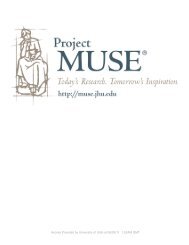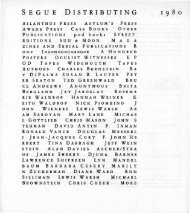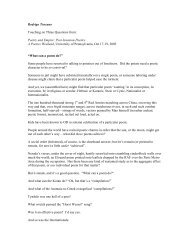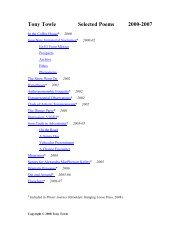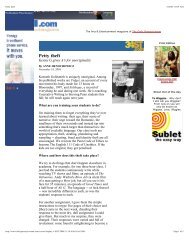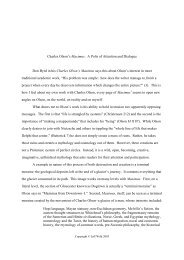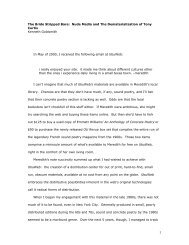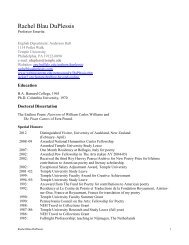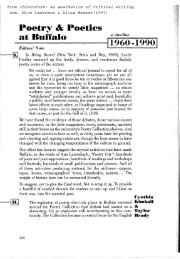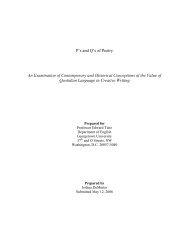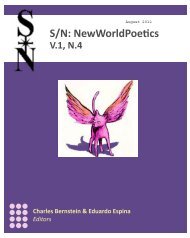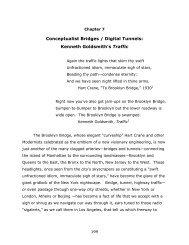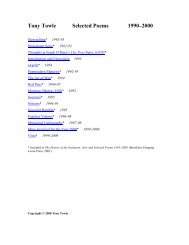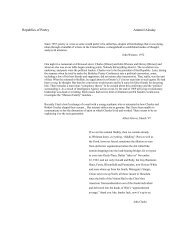Preface - Electronic Poetry Center
Preface - Electronic Poetry Center
Preface - Electronic Poetry Center
You also want an ePaper? Increase the reach of your titles
YUMPU automatically turns print PDFs into web optimized ePapers that Google loves.
pushing Olson for example about ten poets down the line and representing him<br />
with a single poem – well, that’s disgusting. There are I’m sure lots of specific<br />
examples of exclusion from the movement’s early days that others on this list<br />
could tell you about.<br />
However, it seems to me that the anger from LPs about mainstream poetry has<br />
toned down in recent years, and why? Partly because exclusionary tactics like<br />
McClatchy’s are more recognizable for the strongarming they are, and partly<br />
because some wrongs are being righted (the new Norton postmodern etc.). The<br />
breakup that Ron mentioned I think is partly due to the fact that individual<br />
language poets are getting recognized, and that group identification is less<br />
attractive to leaders who are recognizable individually. (I’m not necessarily<br />
speaking of you, Ron; I’m thinking sociologically now.) Certainly Ron has<br />
advocated precisely the kind of more pluralistic reading that you seem to think<br />
language poetry excludes (see his "Canons and Institutions").<br />
From my point of view it’s you, and not me, who describes any liking of<br />
language poetry in exclusionary terms, like the way you assume that I don’t<br />
read what you call "mainstream" poetry – a pretty galling and arrogant<br />
assumption, not to mention 100% wrong. I don’t need to exclude anybody to<br />
desribe my tastes. For example, my favorite poets among the language group<br />
are Ron Silliman, Lyn Hejinian, and Leslie Scalapino (tho she’s maybe not<br />
defined as "in" the group by everybody). These poets make use of prose, which<br />
I find interesting, and they’ve opened for me ways of thinking about the poetic<br />
process (or better, procedure?) that are pretty fresh for me. With Ron there’s a<br />
sense of immediacy in the project at hand, something to be done, and a<br />
willingness not to exclude the seemingly anomalous or "ugly" material. So<br />
some stuff gets left seemingly hanging, but not "wasted," – or "waste" is<br />
reconceived in the process of the poem. My response to Hejinian is I guess<br />
pretty typical – My Life was a pivotal book for me, the work that made me<br />
think, hey, there’s something going on here – and its virtues are more apparent<br />
each time I read it. Since everything I say about her has been said better<br />
somewhere else, I’ll refrain. With Scalapino for me it’s again a question of<br />
process, repetition, and – in her case especially – perspective. How a subject<br />
gets talked around, through, wrung out. Her work is exhausting, and saying<br />
"it’s not for everybody" does not degrade its value for me and for many others.<br />
My reasons for reading each of these poets is often different from my reasons<br />
for liking them, and may include political or research interests: these can be<br />
transpersonal, and I may find the work satisfying in these respects and worth<br />
promoting to others. I may even critique other poets as not meeting such needs



